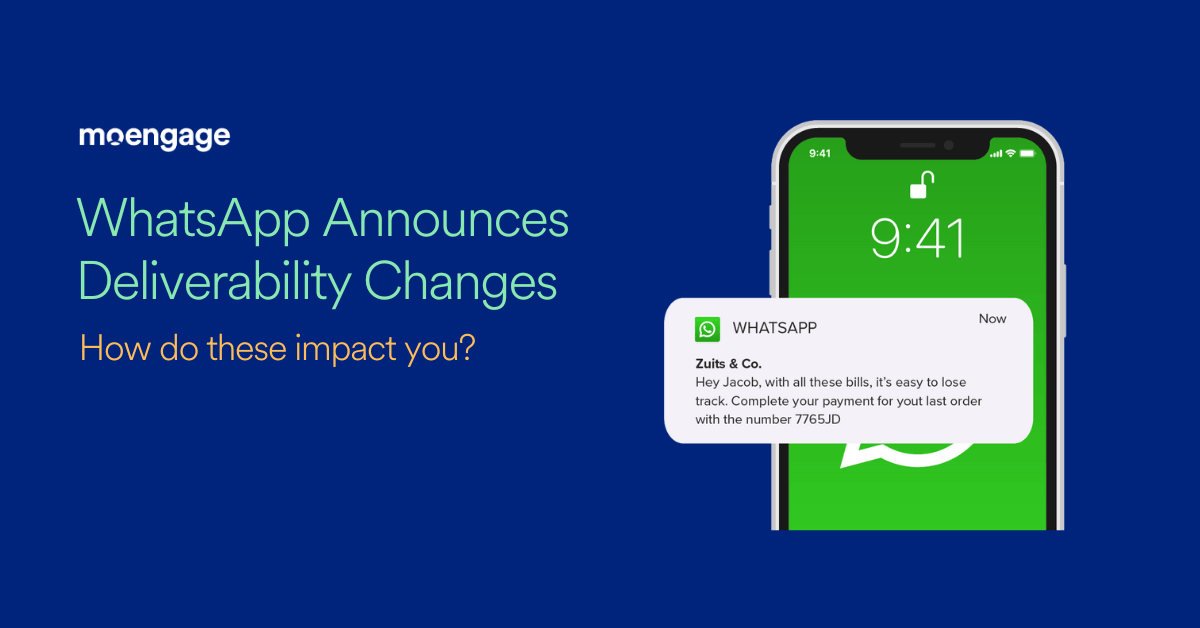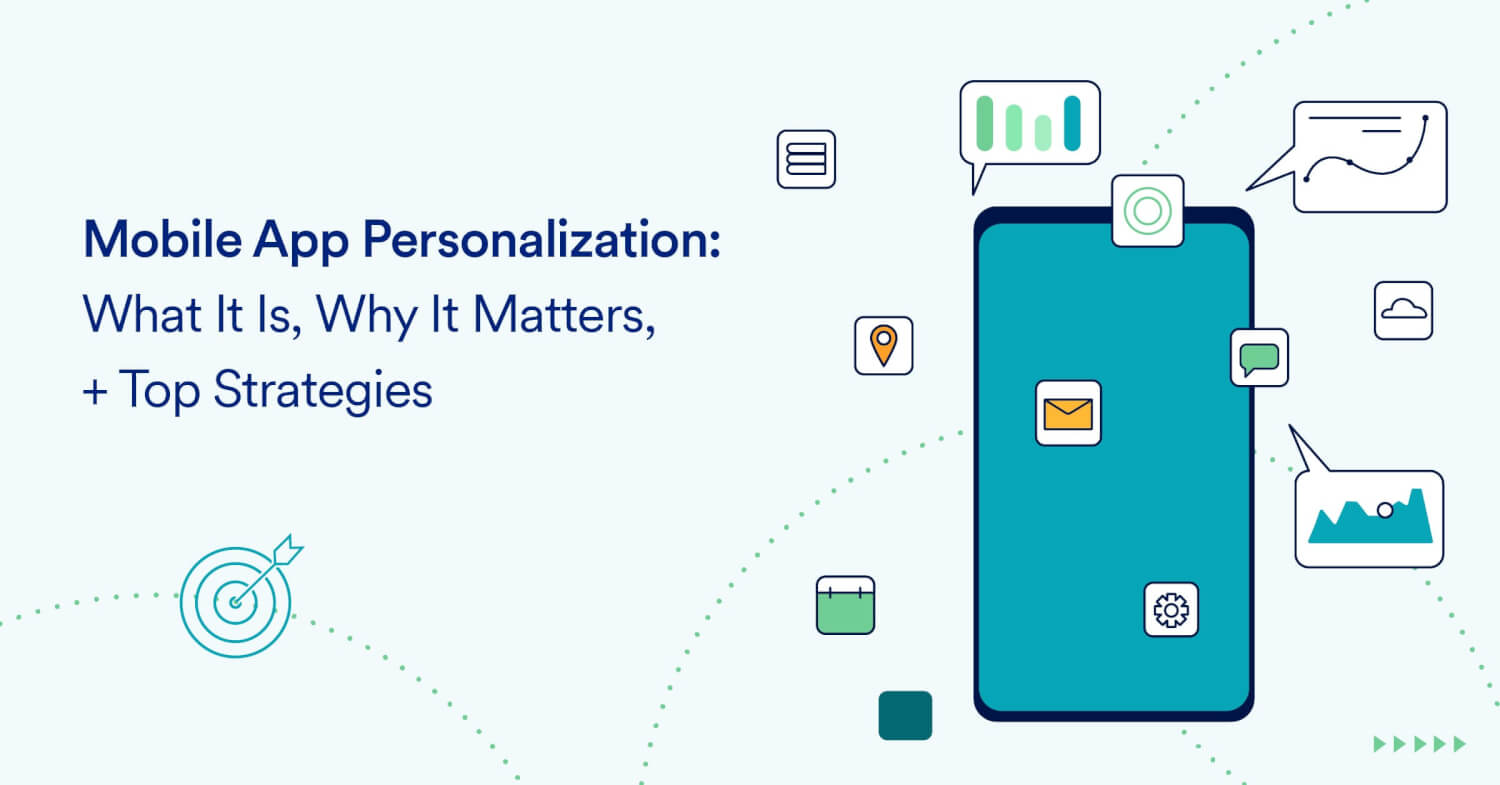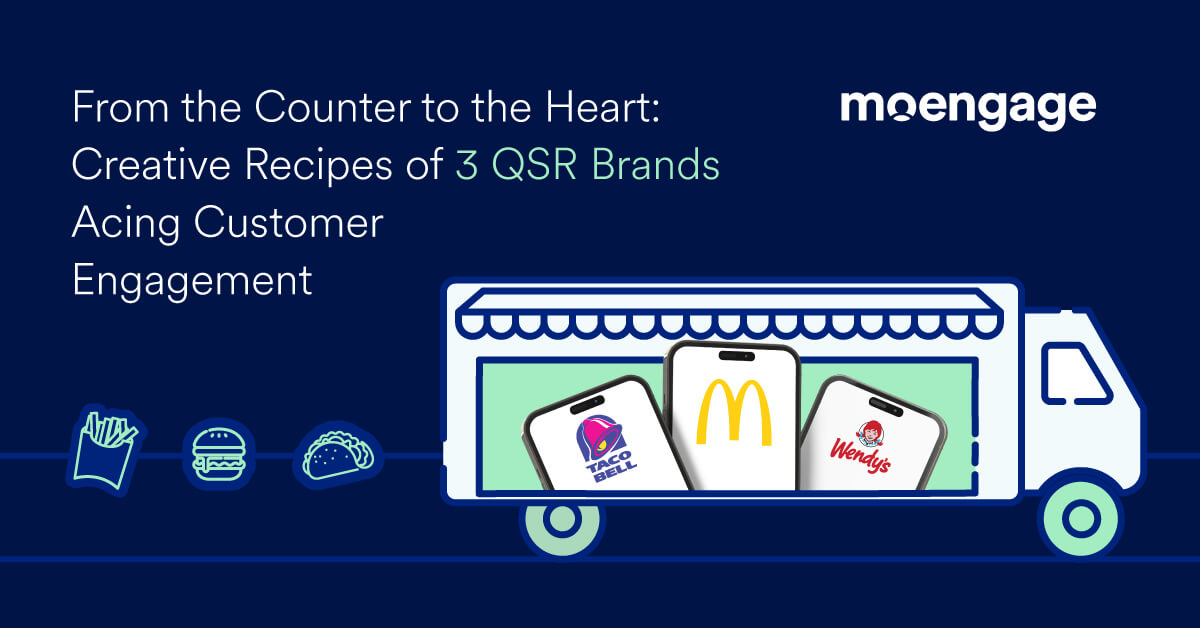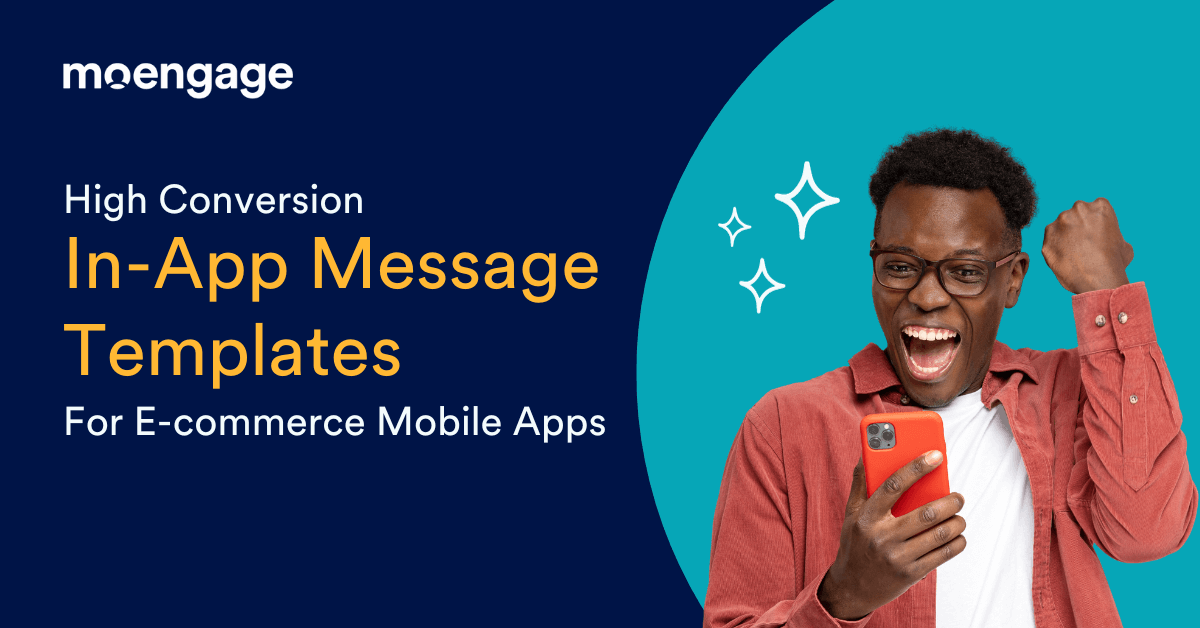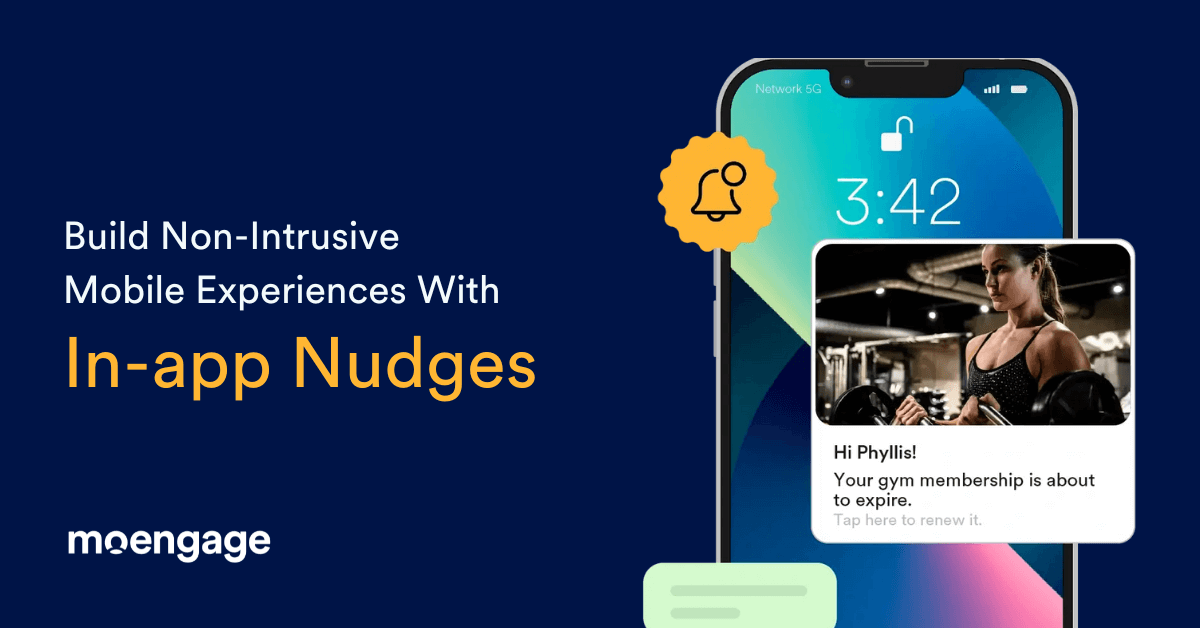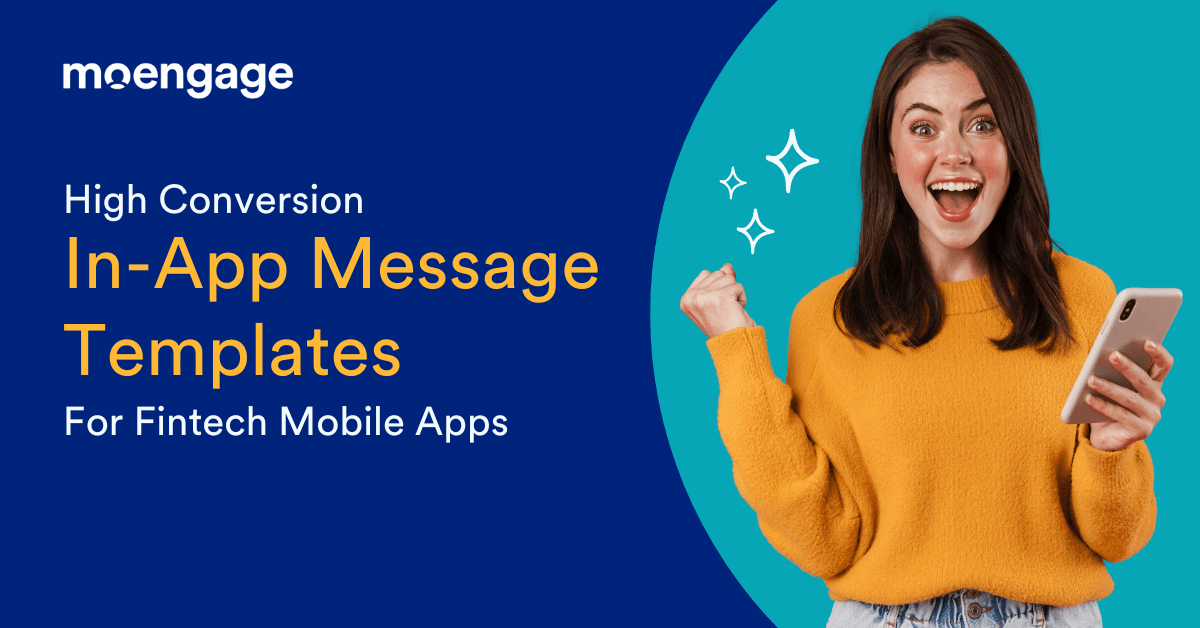WhatsApp Marketing in 2024: Ready-to-use Campaign Ideas for Consumer Brands
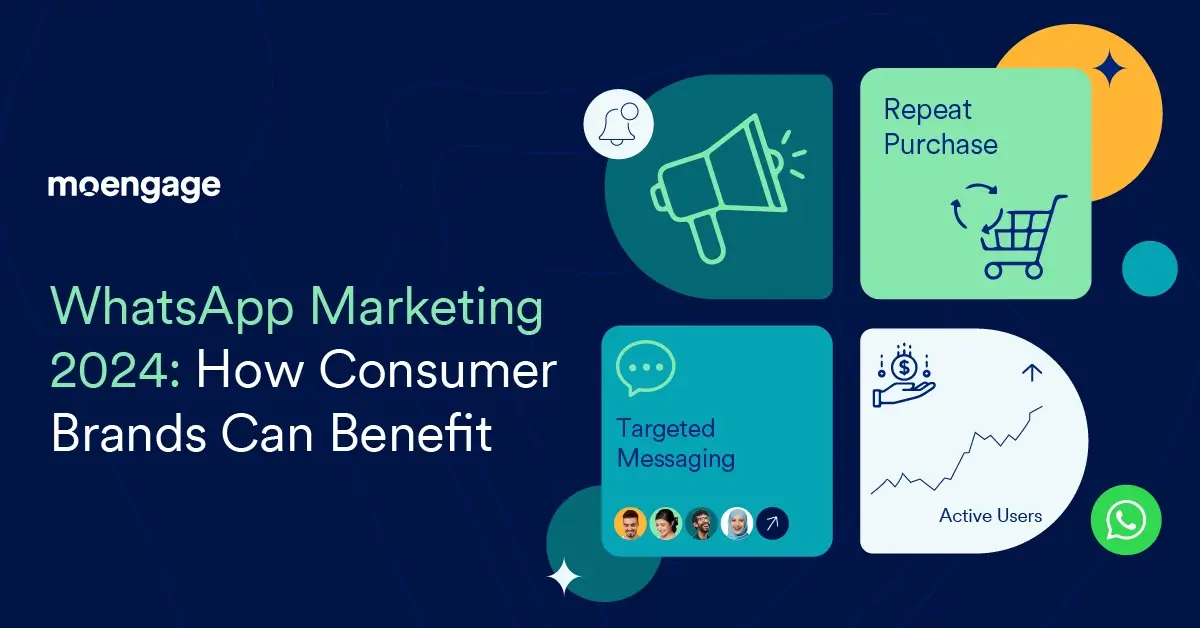
Reading Time: 10 minutes
| 🔍 Download our latest Ebook to understand how to use Whatsapp Business for marketing and conversational commerce. |
The modern consumer is always looking for an ideal way to communicate. With recent technological advancements and tech companies developing better communication channels, consumers quickly adopt newer channels. Today, most consumers prefer conversational messaging platforms such as Facebook, Instagram, Snapchat, and WhatsApp to communicate.
According to Gartner, by 2025, proactive customer engagement interactions will outnumber reactive customer engagement interactions. By transitioning to messaging platforms, consumer brands will reduce dependency on native mobile app experiences, reduce cost, increase digital and self-service effectiveness, and achieve a persistent experience for customer engagement.
WhatsApp, for example, is one of the most used messaging apps globally, with over 2.78 billion active customers. Every day, at least 100 billion messages are sent via this messaging app.
Most Popular Messaging Apps
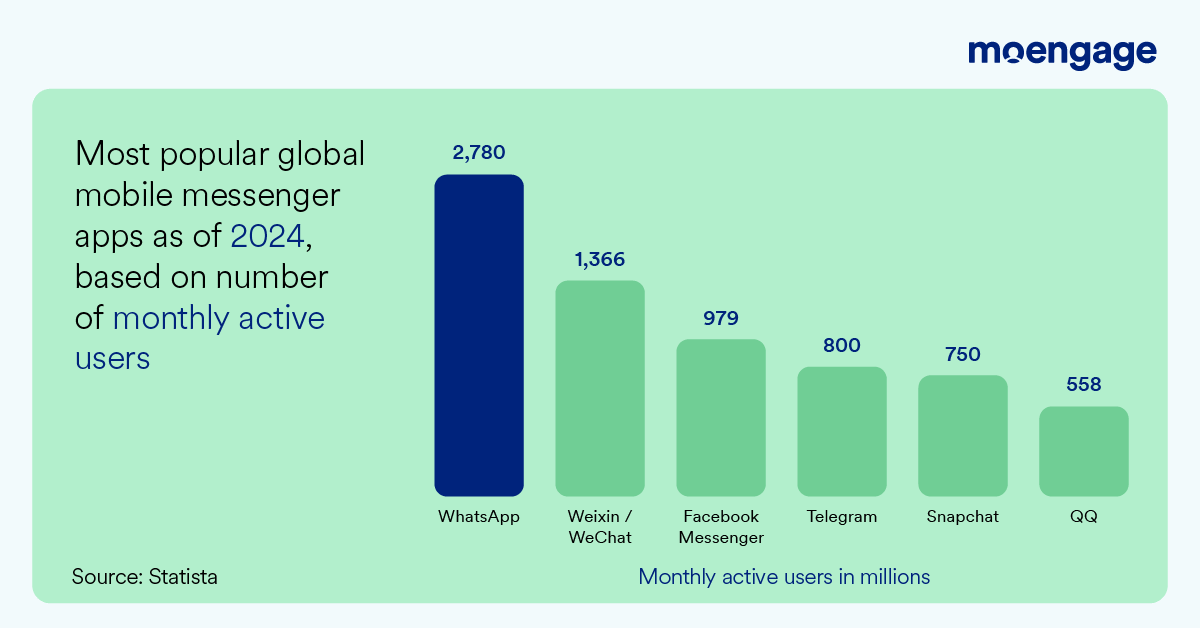
What is WhatsApp Marketing?
With billions of consumers using WhatsApp multiple times daily, businesses have begun leveraging it as a new channel to communicate with their customers. WhatsApp allows businesses to send marketing messages directly to customers, win their trust, and make them loyal to their brands. Most customers will likely remain loyal and shop directly with a brand that communicates to them on their preferred channel.
Below are a few statistics about WhatsApp that reiterate why it’s a must-have –
- By the end of 2024, the total spending on the popular instant messaging app’s business platform is expected to amount to 3.6 billion U.S. dollars.
- WhatsApp is available across 180 countries and is accessible in 20+ languages.
- An average customer opens WhatsApp around 23 to 25 times a day.
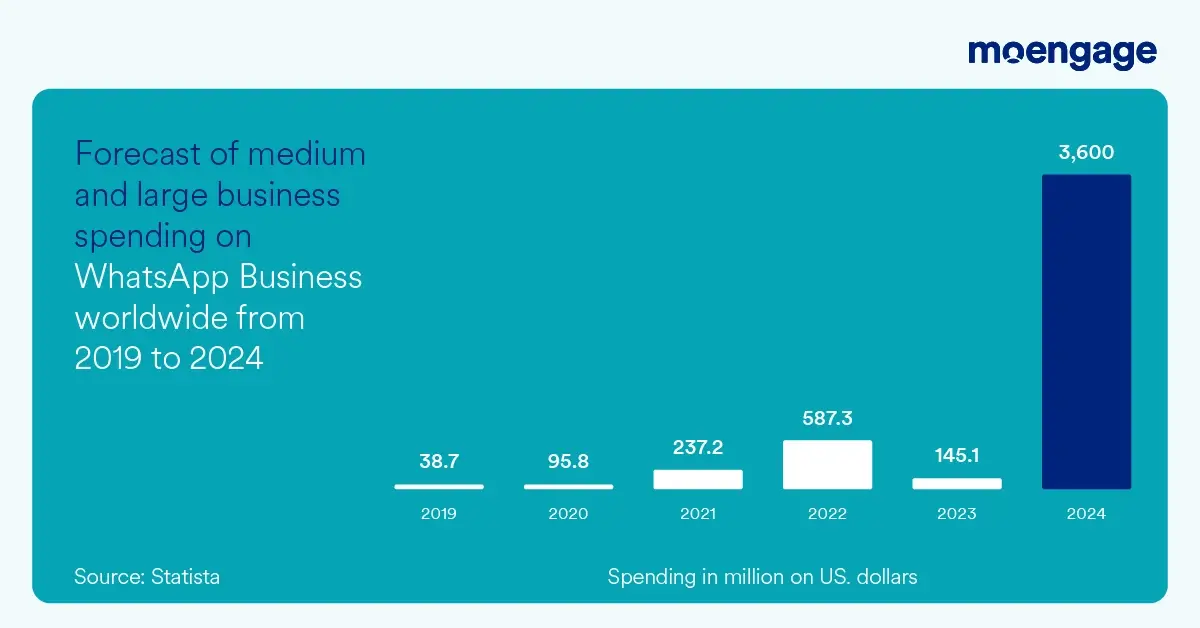
| Did you know that personalized WhatsApp campaigns can drive up to 3X the ROI? Check out your potential ROI using our WhatsApp ROI Calculator. |
How to Do WhatsApp Marketing?
In the recent, Business Messaging Research Study, around 70% of the respondents mentioned that they were likelier to do business with an organization that could connect with them via a messaging app than one that could not.
Now Imagine? A customer travels from City A to City B via two airline carriers and needs their boarding pass on their phone to travel. What sounds better for the customer’s experience: Downloading a bunch of extra applications or sending the customer the tickets via WhatsApp?
Let’s understand this with another example. A customer went to your website, added several products to the cart, filled in all the details, and then exited at the last minute before the payment was made because they received an important call. They forgot to carry on after the call. Wouldn’t it make more sense to send them a message on WhatsApp to follow up or return to the payment landing page?
It is not just about adopting a new channel to increase customer engagement or to add more options to your marketing strategies. WhatsApp is the future for accelerating your sales outcomes as well. Sales made through conversational commerce channels like chatbots, digital voice assistants, and instant messaging platforms will grow more than sevenfold from $41 billion in 2021 to $290 billion by 2025, according to Juniper Research.
WhatsApp is evolving, and so should your engagement strategies. With an instant messaging platform like WhatsApp, there are a lot more possibilities than just informing your customers about great new deals and offers, including:
- Redirecting them to a landing page after a failed/incomplete purchase.
- Sharing a product catalog to inform customers about your latest products.
- Automating customer support and doing away with lengthy customer calls.
- Taking feedback from your customers proactively using automated messages.
Messaging platforms have come a long way since the early days of character-limited messaging. With WhatsApp dominating the messaging platform across geographies and demographics, customers are careful about where to invest their most valuable currency: time. They prefer to give their precious time to something other than organizations that make the engagement journey cumbersome and full of stopgaps instead of a streamlined, easy process.
How to Use WhatsApp Business for Marketing? (and Examples of Marketing Messages)
There are multiple customer stages where you could leverage WhatsApp. Below are a few popular ones –
Onboarding
The first step of the customer journey typically involves sending your customers marketing messages that help them familiarize themselves with your product offerings. However, it greatly depends on the industry.
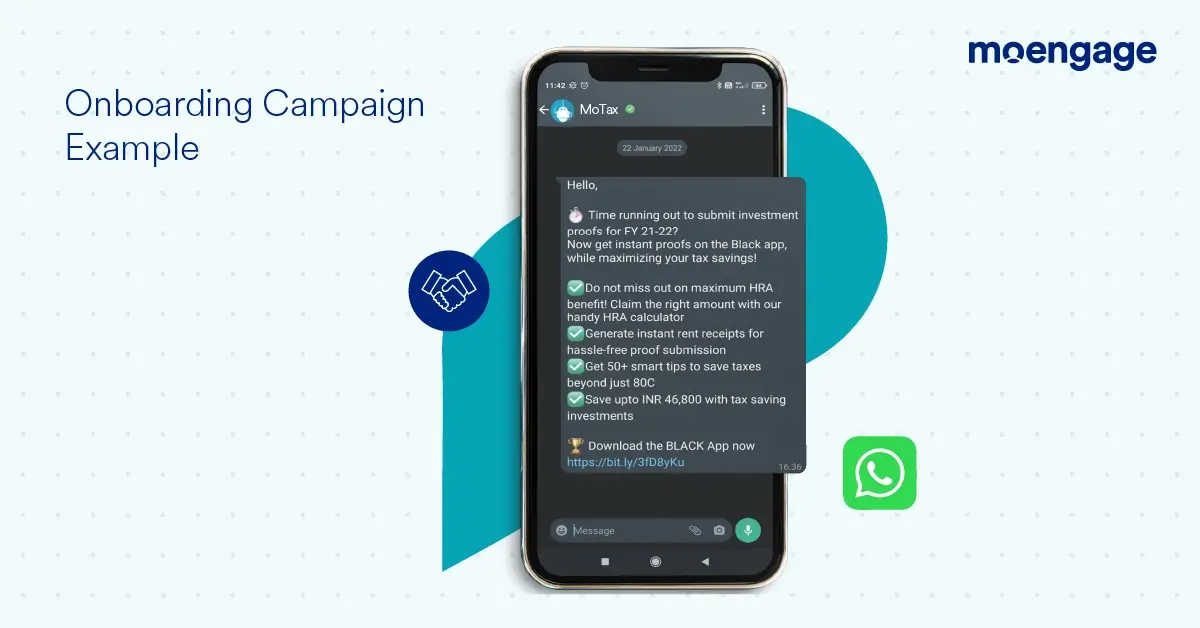
For example, KYC or Know Your Customer is a standard customer verification that many organizations perform during onboarding, particularly if the future transactions are financial (e-Wallet, setting up new accounts, BNPL, etc). With WhatsApp, you can always set up an automated process to complete the KYC process, either by asking customers to send documents or redirecting them to a landing page to submit these. Additionally, post-submission, you can always inform your customers of the status of their KYC process.
Recommendations
Although every step of the customer journey is important, if you want to drive many customers to your website/app, very few things are as important as sending personalized content recommendations.
Here’s an example: Suppose a segment of your customers like Korean drama a lot, but don’t enjoy psychological thrillers (all that violence!). The OTT platform can segment such customers and send them relevant content suggestions they might enjoy over the weekend.
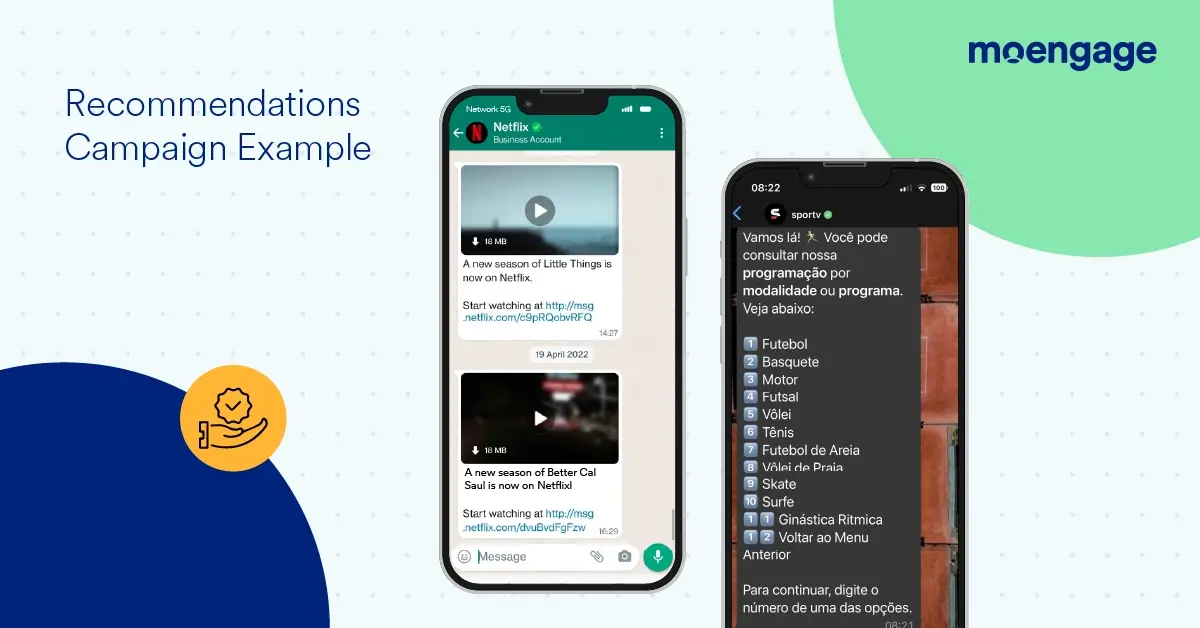
Brands need to vary of the fact that they can’t share irrelevant suggestions. This is because they’re unlikely to click through and engage. Some customers will even unsubscribe from their WhatsApp communications altogether! And that is how consumer brands experience churn!
First Purchase
First purchases are always exciting, and ensuring that your customers go for them is important. Not only does this help you understand your customers better, but it also helps with the next purchase stages. Now, with more information about your customer’s preferences, you can suggest better products on WhatsApp. This will help create a better experience and help them search for products relevant to their needs.
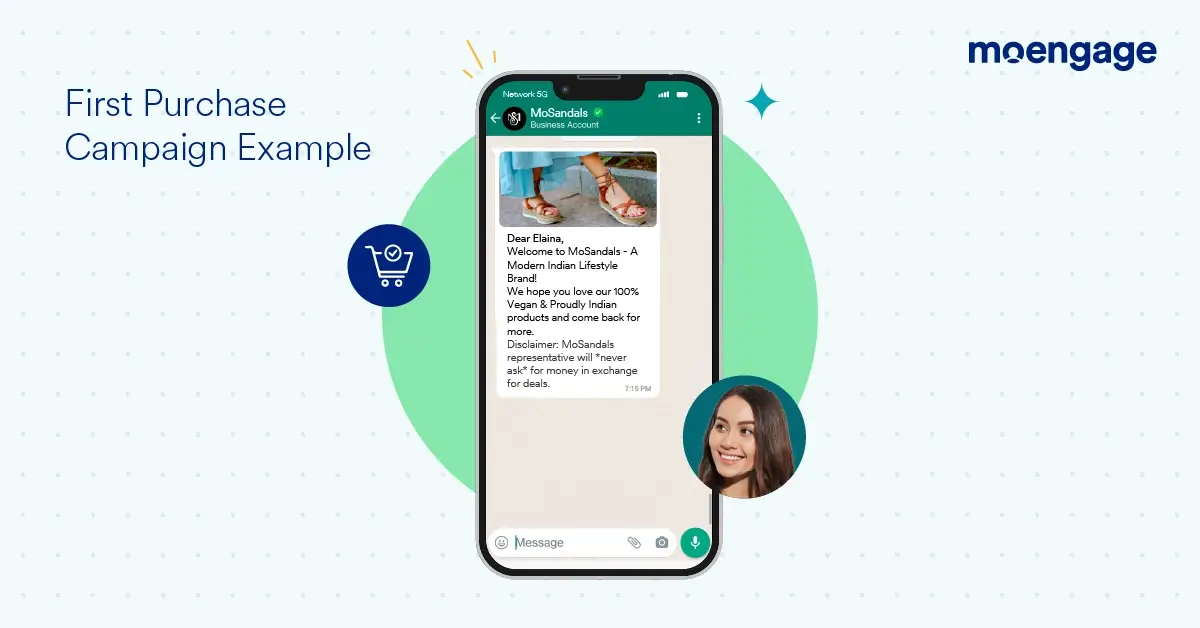
Subscription and Adoption
Today, many consumer apps, especially those from the D2C and OTT/Media industry, are subscription-based. To drive conversions, organizations should use new and innovative channels to drive adoption and engage with existing customers who have dropped off from the platform at some point in the customer cycle. One of the most common ways to drive adoption is to message customers who are unaware of your platform but are using other products regularly.
For example, OTT companies can send them personalized recommendations, offers, and benefits that can help them with an actively engaged audience.
Repeat Purchase/Product Recommendations
As your customers purchase more and more products to suit their needs, you will become more familiar with their preferences to personalize messages even further. This does not stop with only product recommendations; you must always strive to make customer experiences better and smoother, and this is where you need to craft a strategy to ensure that they not only come back to your platform but also actively engage with your brand. Remember, to improve customer lifetime value (LTV) and achieve better ROI, you need to drive sales for repeat business through WhatsApp marketing.
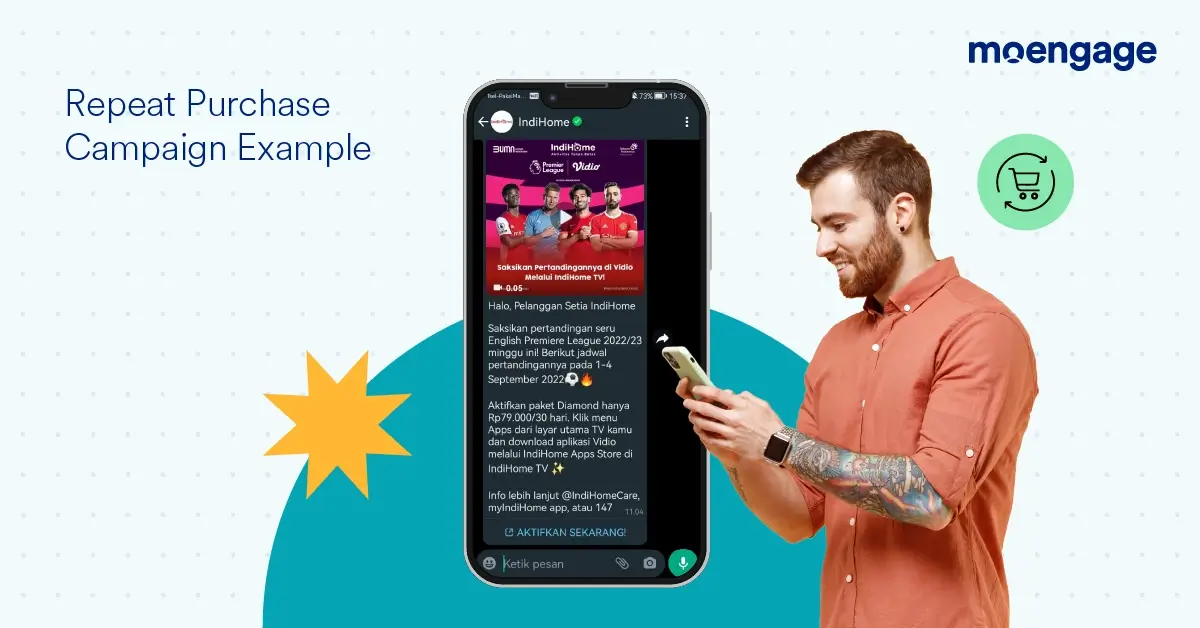
Reactivation
Do not worry; you can always bring them back with innovative channel marketing. With WhatsApp as a channel, you can send them relevant products from time to time (it is important to space out recommendations for dormant customers), offer them amazing deals on re-purchases, and help them go straight to the landing page. And since WhatsApp as a channel has great delivery and reading rates, WhatsApp messages will always hit home!
Examples of Successful WhatsApp Marketing Campaigns Globally
Below are a few successful WhatsApp marketing campaigns from different brands worldwide we wanted to highlight. These are proven WhatsApp marketing strategies that real brands have leveraged to increase sales and drive customer satisfaction.
1. Airtel Xstream (OTT)
To drive installation and adoption for their OTT platform, Airtel, one of the largest Telecom providers, leverages new-age channels such as WhatsApp. By triggering timely updates to customers through WhatsApp, they significantly increased new installs and adoption for Airtel Xstream.
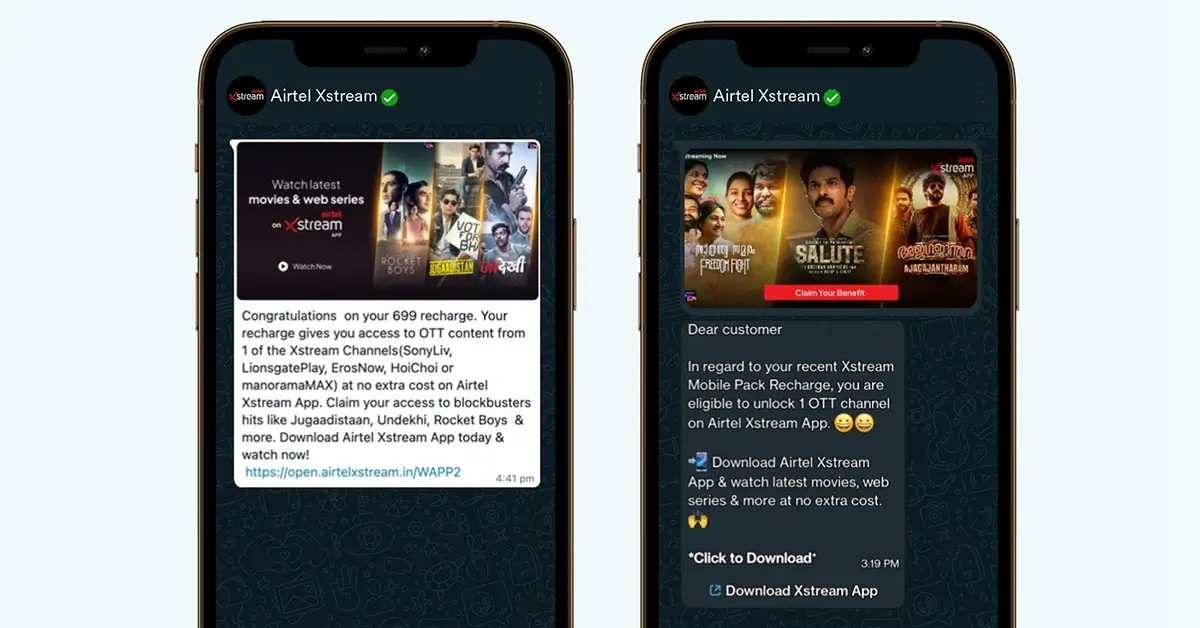
With every recharge an Airtel customer did, they received a WhatsApp message about the Airtel Xstream opportunity they could enjoy. This strategy helped them reach larger customers while ensuring an enriched brand experience. This experience, in turn, helped increase downloads for the Xstream app, which also helped drive content consumption on Airtel Xstream.
This strategy helped them to increase their application installation by 20%. You can read the complete story here.
2. Amazon (E-commerce)
For any E-commerce brand, it’s critical to keep their consumers updated about their order. For example, Amazon leverages WhatsApp to notify consumers whenever a package is out for delivery.
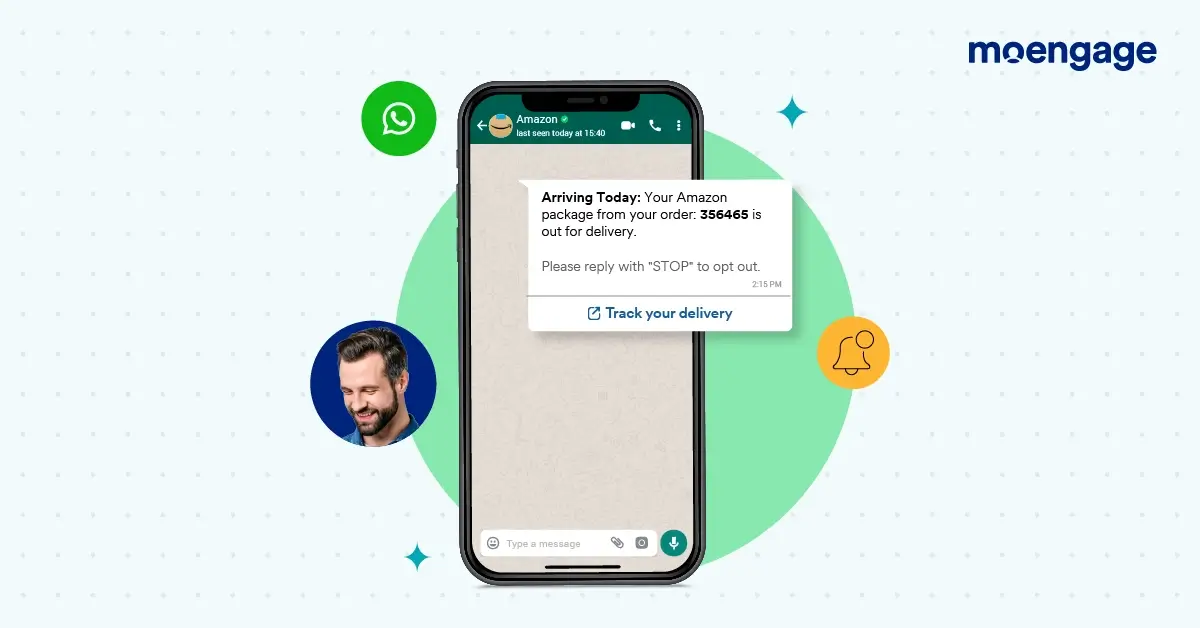
In the message, Amazon shares critical details, including contact details of the delivery person, OTP (if the package requires one), the tracking URL, the item code, and more details.
By leveraging an additional channel, Amazon ensures that consumers don’t miss out on important notifications, including shipping updates.
Additionally, Amazon leverages WhatsApp to promote offers and deals. However, they use a complete account to do it. This ensures that shipping updates don’t get mixed with promotional messages. This also allows consumers to opt out of promotional messages while still receiving critical shipping updates.
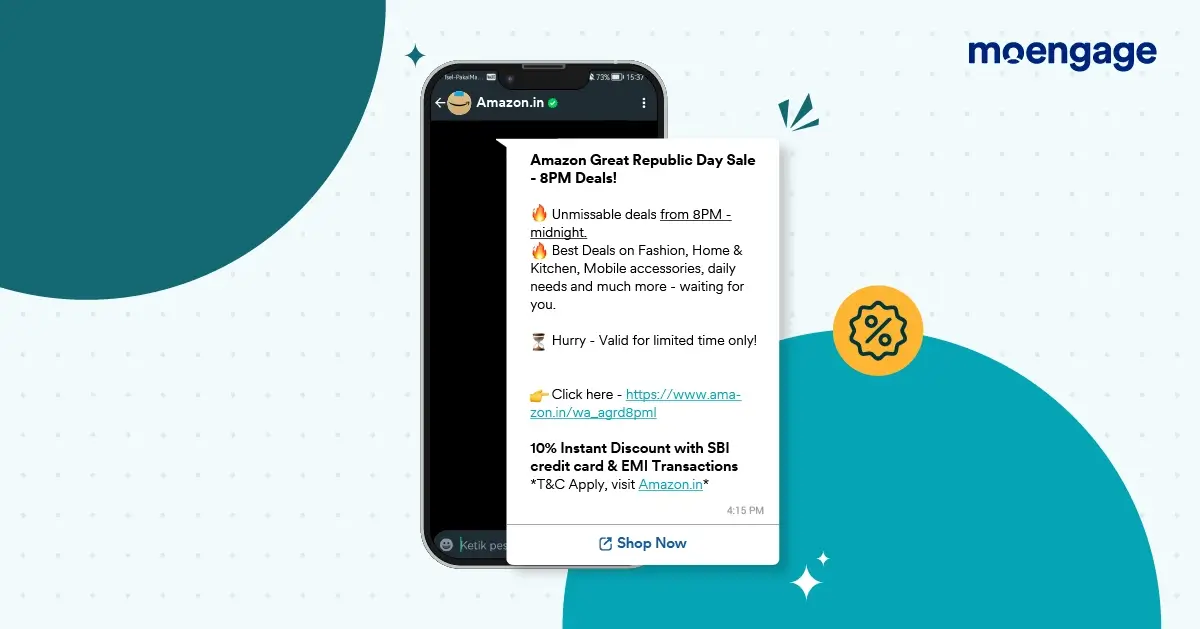
3. Navi (Fintech, India)
Navi, a financial services company based in India, leverages WhatsApp to increase insurance upsells.
While Navi leads when it comes to consumer loan sales, they figured that most consumers interested in taking a loan were also interested in getting insurance. To capitalize on this, Navi leveraged WhatsApp by nurturing interested customers. As soon as a customer showed interest, all the details about insurance were sent on WhatsApp, including the application process. If the consumer had a doubt, they could ask questions within WhatsApp.

Not only did this reduce wait time for customers, but it also helped them proceed through the stages without manual interaction, which added delays to the process. This helped them increase their insurance upsell conversions by 1.5X! You can read the complete story here.
4. Segari (E-commerce, SEA)
Segari, an online retail platform based in Indonesia, leverages WhatsApp to improve customer engagement and drive customer loyalty.
Segari leverages WhatsApp to promote the latest offers and announce new products to consumers. Using WhatsApp, they reached 90% of its consumers, and over 60% were engaged with their messages.
This helped them drive growth and customer loyalty in the increasingly competitive marketplace. Read the complete customer story here.
5. HDFC Bank (BFSI, India)
HDFC Bank is India’s largest private-sector bank. They leverage WhatsApp to promote offers, share feature updates, and remind consumers when they miss a call from their account managers –
Promote offers
They leverage the channel to share offers around credit card and personal loans. For example, a WhatsApp campaign is triggered when consumers are eligible for a higher credit card limit.
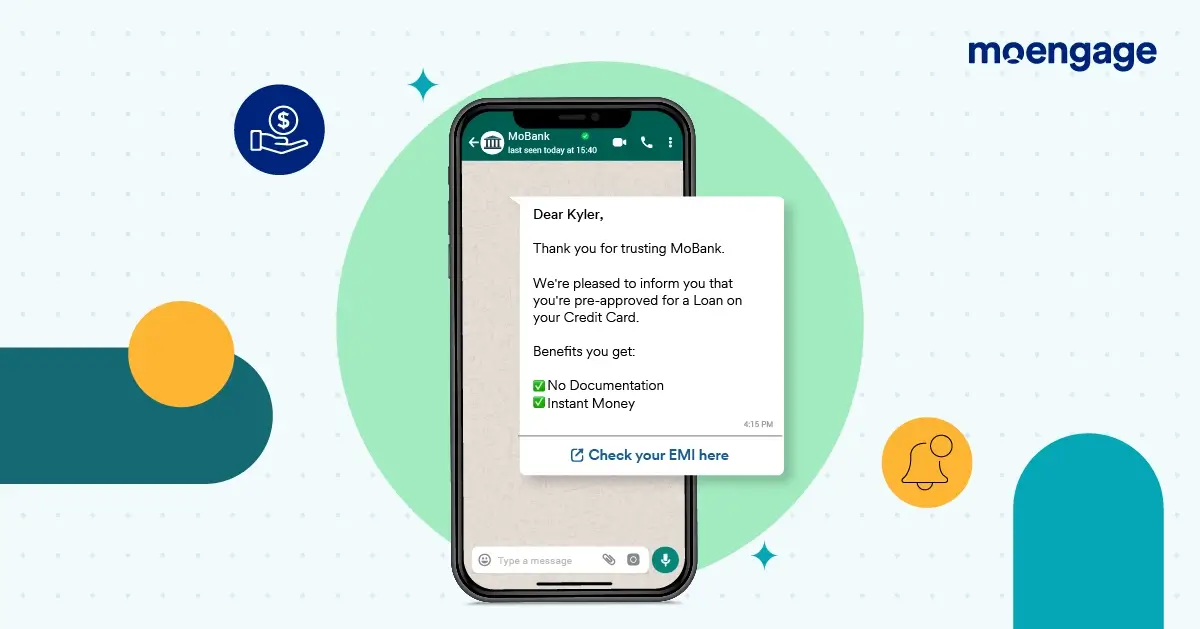
Missed Call Reminders
Whenever a customer misses a call from their account manager, a message that reminds them to call back is triggered. The message includes critical details, including their contact number and when they can call them.
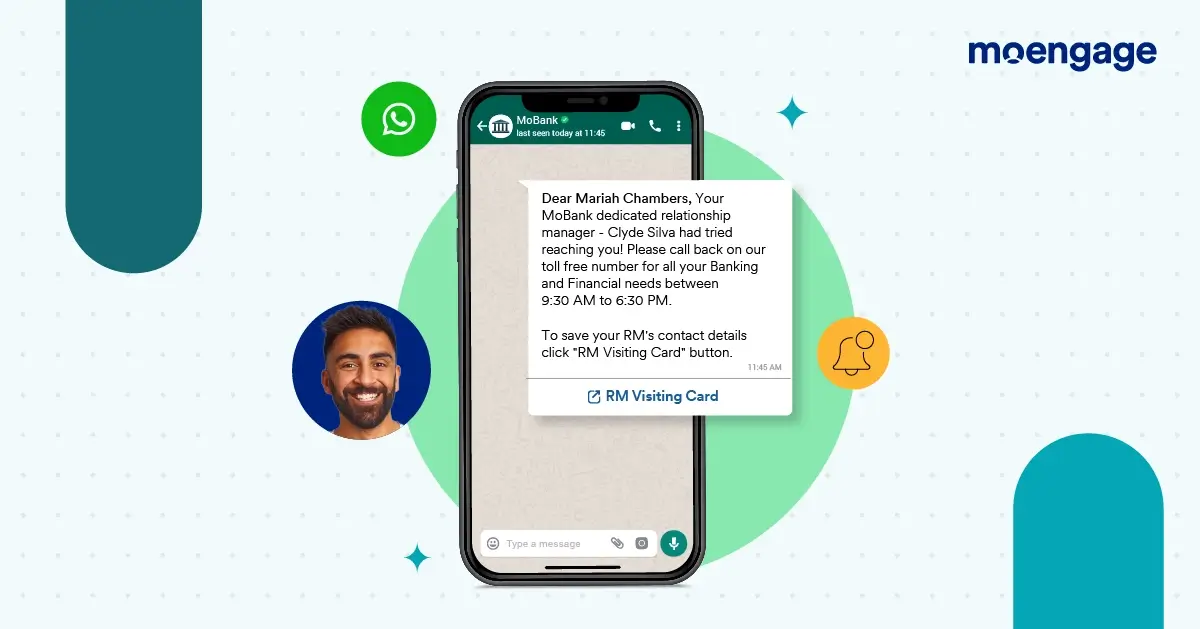
Product Adoption
HDFC Bank triggers multiple WhatsApp campaigns explaining different app features so customers can utilize them.
Get Started with WhatsApp Marketing
Follow these steps if you want to get started on WhatsApp marketing.
Step 1 – Install the WhatsApp Application
Firstly, install the WhatsApp app and create a WhatsApp business account. You should make a name for your business using the 25 characters, upload a profile picture, and describe your business in the status section.
Step 2 – Add contacts to your business account
You can import contacts from your brand who have opted-in for WhatsApp communication.
Step 3 – Create Different Customer Segments
Using the WhatsApp Business app you can create different WhatsApp groups for your customer segments to enable group messaging. WhatsApp is currently supporting up to 256 contacts per group.
Step 4 – Craft Content
Create WhatsApp content for different groups and post them at the right time. WhatsApp has the highest open rate compared to direct emails. This means your WhatsApp messages are more likely to reach customers. You have to make the message straightforward and relevant to the target audience.
Unlock the Full Potential of WhatsApp Marketing with MoEngage and WhatsApp Business API
WhatsApp is an essential touchpoint in your consumer’s digital journey. To fully utilize the benefits, including WhatsApp as part of your omnichannel marketing strategy is critical. MoEngage helps you combine the power of customer behavior, interests, and analytics to kickstart your WhatsApp communication strategy – all through a single platform.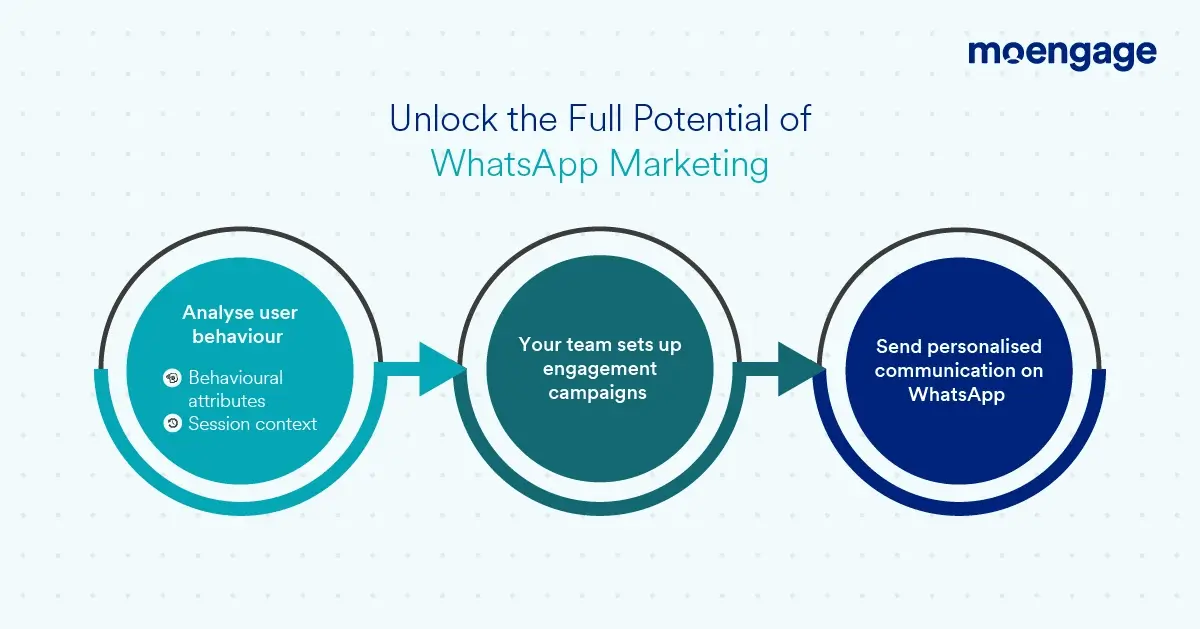
Using MoEngage, you can analyze your audience based on their demographics and behavioral attributes. Using these insights, you can create personalized omnichannel engagement strategies that extend to your WhatsApp communication.
Three most popular ways in which brands like yours use MoEngage to execute WhatsApp marketing campaigns –
Personalization using Segmentation
If you’re a MoEngage customer, you can leverage your existing segments(or even create new ones) and build highly personalized WhatsApp campaigns.
Connected experience using MoEngage Flows
You could integrate WhatsApp into your existing customer journeys in a seamless manner for better engagement.
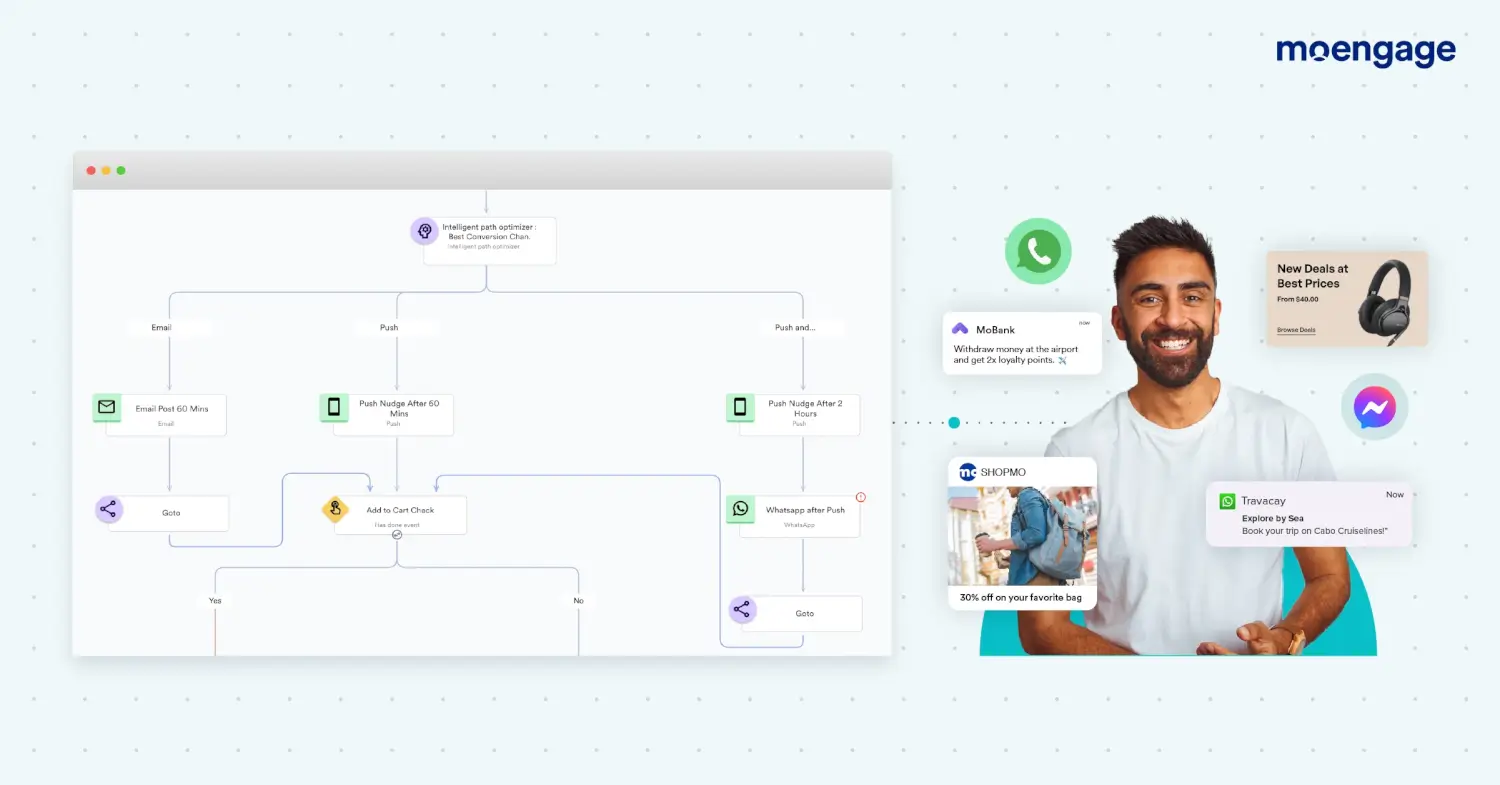
Smart Triggers for real-time engagement
Trigger 1:1 WhatsApp messages and engage potential customers during the micro-moments in their purchase journey.
Click here to learn more about integrating WhatsApp into your MoEngage campaigns and see an upward conversion improvement.
Should Brands Look to Adopt WhatsApp?
WhatsApp gives you and your business a platform to connect and interact with customers outside the business website. As millions of consumers use the messaging app daily, WhatsApp proves to be one of the best marketing tools for any business. We’ve covered why you should consider using WhatsApp to market your business today.
Brands looking to increase the adoption of their products/platforms or wanting to grow their revenue through a new and innovative engagement channel due to stagnant customer growth issues should definitely explore WhatsApp as a new channel for their marketing strategies.
It can act as a perfect channel for building trust with your customers while sending them important information about both your brand and your products. And the best part is, this channel, like some of the best marketing channels, is vertical/sector agnostic. As long as your brand has something meaningful to offer to your customers, WhatsApp can definitely help you grow your business!
What’s Next?
- Read our latest blog on how consumer brands can leverage the power of WhatsApp with MoEngage.
- How do marketers walk the tightrope between personalization and customer privacy? Watch here.
- Read how brands like yours use an insights-led engagement platform to win more customers.
- Were you looking for tactics for customer segmentation and automation? Watch how winning brands get this right.

